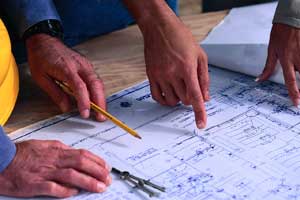Civil Engineer
Tasks & duties

Civil engineers may do some or all of the following:
-
consult clients, other professionals and government officials
-
study, investigate and evaluate construction and land-development sites
-
plan and design structures such as roads, drainage and buildings that are required for the sites
-
work within the guidelines of the local government authority
-
get plans approved by relevant authorities
-
prepare cost estimates and contract documents for work
-
tender contracts and find contractors to do the work
-
supervise and monitor construction to ensure structures are built in accordance with construction drawings and contracts and that standards are met
-
attend construction-site meetings with contractors and clients
-
ensure assets, such as regional water plants and roading, and their allocated budgets are efficiently managed
Civil engineers, particularly those working as asset managers for local councils, may also be involved in risk-assessment work, conduct public surveys, hold public forums and write long-term council plans.
Specialisations
Geotechnical engineer
Geotechnical engineers focus on the foundations for large structures, such as dams, tunnels, retaining walls or jetties, and how the soil and rock they are built on may affect them.
Transport engineer
Transport engineers plan, design and construct transport networks such as railways, airports and harbours.
Earthquake engineer
Earthquake engineers specialise in designing structures to safely resist the forces of earthquakes. They also assess existing structures for earthquake risk and design appropriate strengthening.
Skills & knowledge

Civil engineers need to have:
-
knowledge of civil engineering
-
creative and design skills for developing their designs
-
skill in analysing and interpreting information, such as the requirements of their clients
-
knowledge of surveying methods
-
knowledge of relevant legislation such as the Resource Management Act, the New Zealand Building Code, local by-laws and town planning regulations
-
knowledge of physics and maths
-
problem-solving skills
-
planning and organisational skills
-
good communication skills
-
writing skills for producing reports
-
computer skills, including the ability to use computer-aided design (CAD) software
Entry requirements
To become a civil engineer you need a Bachelor of Engineering. A Diploma in Engineering (which replaced the New Zealand Certificate in Engineering) or an equivalent diploma may also be acceptable.
Secondary education
To enter tertiary training, Bursary or NCEA equivalent English, maths with calculus, physics and chemistry is preferred.
Training on the job
Skills are gained on the job. Civil engineers may also attend courses, seminars, workshops and conferences to keep their skills up to date.
Civil engineers may apply to the Institution of Professional Engineers New Zealand (IPENZ) to become a chartered professional engineer (CPEng) after:
-
completing relevant qualifications
-
gaining appropriate work experience (usually four to five years)
-
completing a practical competency assessment
To maintain registration, chartered engineers need to demonstrate their ability to practice and display evidence of undertaking professional development at least every five years.
Registration
Civil engineers should be registered with the Institution of Professional Engineers New Zealand (IPENZ).
Useful experience
Useful experience includes work in the building construction or roading industries, environmental, draughting or surveying work, and any practical work such as site investigations or geotechnical testing.
Video
From just a job on you tube
Related courses
Building Science and Technology
Construction Engineering
Environmental Engineering
Structural Engineering
Transport Engineering
Water and Sanitary Engineering
For more information, please refer to Career Services.
Document Actions
